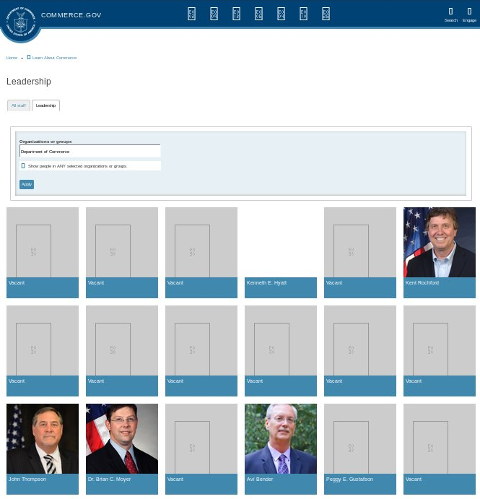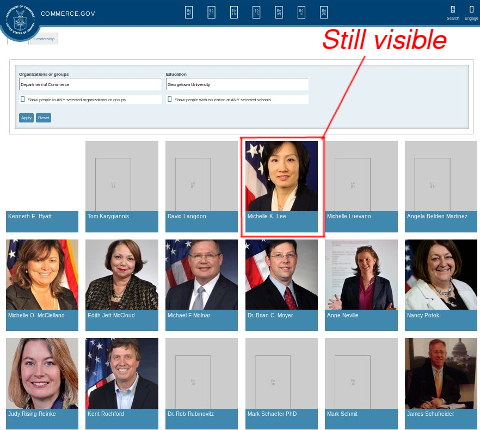
 Leadership positions mostly vacant as of today (screenshot taken minutes ago)
Leadership positions mostly vacant as of today (screenshot taken minutes ago)
 Michelle Lee still listed
Michelle Lee still listed
2017 is looking pretty good so far, especially if leadership of the USPTO remains the same (we are still waiting for an official confirmation, as we last noted last night). There are some upcoming SCOTUS cases that promise to change the patent system for the better.
"There are some upcoming SCOTUS cases that promise to change the patent system for the better."With the Lexmark case pending -- a case on which the Electronic Frontier Foundation (EFF) weighed in -- some people have reasons for optimism. Today we found quite a few news articles about it, e.g. "How Lexmark's patent fight to crush an ink reseller will affect us all" (from the British media), "Supreme Court Should Block Printer Company’s Ploy to Undermine Consumer Rights" (from the EFF), "Printer Co. Urges Justices To Uphold 'Bedrock' IP Standard" (from the patent micrososm's site), and "Consumer Rights at Center of Impression v. Lexmark Supreme Court Case, Groups Argue" (from Public Knowledge). To quote from that last one:
The following may be attributed to Charles Duan, Director of the Patent Reform Project at Public Knowledge:
“We are proud to stand with a diverse group of organizations in supporting the most basic consumer right, the right to use one’s own property without interference from the seller.
“Today, companies who make consumer products go to astounding lengths to control what consumers may do with the products they purchase. Manufacturers and their product terms of service have gone so far as to cut off consumers’ right to speak about products, to block product safety research, to restrain competition, and to eliminate the most basic property rights to use and resell one’s own possessions.
“Patent exhaustion has long stood as a bulwark of consumer protection, preventing seller companies from overrunning the rights and expectations of buyers. We hope that the Supreme Court continues to recognize the importance of patent exhaustion as a consumer protection doctrine.”
Predicting Patent Policy Under the Trump Administration
The America Invents Act (“AIA”), signed into law by President Obama on September 16, 2011, was the biggest legislative overhaul to the United States patent system since the Patent Act of 1952. Among other changes, the AIA moved the U.S. to a first-inventor-to-file patent system, created a variety of new post-grant validity proceedings, and eliminated “best-mode” as a litigation defense. The AIA received broad bi-partisan support in both Congressional chambers over the objections of the National Small Business Administration, which argued that the first-to-file provisions would favor “large incumbent corporations.”1 Since its enactment, the AIA has already significantly changed the patent landscape for stakeholders and practitioners alike. For example, inter partes review proceedings have exploded in popularity and have drastically affected litigation strategy, arguably making it much more difficult for patent owners to enforce their patents.
[...]
This article provides informed speculation on the Trump Administration’s potential positions on patent policy, especially as it contrasts with what patent practitioners were expecting from Ms. Clinton.